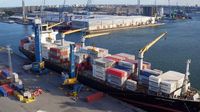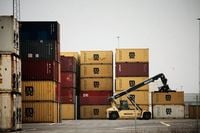The European Union is preparing to implement export restrictions on certain goods shipped to the United States, a move that could escalate the ongoing trade war initiated by President Donald Trump last month. This potential action comes as negotiations between the two economic powerhouses remain tense, with the U.S. having imposed new tariffs on approximately €380 billion ($432 billion) worth of EU products.
As of April 17, 2025, the EU's proposal for these restrictions is being framed as a deterrent, intended to be enacted only if discussions with the U.S. fail to yield a satisfactory resolution. Sources close to the negotiations indicate that the EU is weighing its options carefully, with the aim of protecting its economic interests amid rising tensions.
In the meantime, many European companies are rushing to export their products across the Atlantic. They are acting swiftly to avoid the anticipated increase in customs duties, which are expected to take effect following a 90-day pause in tariffs. The urgency is palpable, as businesses strive to get ahead of the curve before potential surcharges are imposed.
The port of Antwerp in Belgium, a crucial hub for transatlantic trade, has reported a 3% increase in container exports to the U.S. during the first quarter of 2025 compared to the same period in 2024. This uptick is largely attributed to companies accelerating shipments in anticipation of the new tariffs. Notably, European steel exports through Antwerp rose by 2%, while vehicle exports increased by 1% within the same timeframe.
Lennart Verstappen, a spokesperson for the port of Antwerp-Bruges, explained the current climate: "Some companies are anticipating these customs duties and have decided to export their products before they are imposed. But if we look in general from the point of view of the port, if we look at all the different segments and categories, this impact is rather limited." His comments reflect a cautious optimism amid the uncertainty surrounding the trade situation.
Antwerp holds significant importance as Europe’s second-largest port after Rotterdam, serving as a vital gateway for goods moving to and from the continent. In 2024, the U.S. was Antwerp's second-largest trading partner, with nearly 28 million tonnes of goods exchanged. The port facilitates the export of a variety of European products, including cars, machinery, pharmaceuticals, chemicals, steel, and food items. Conversely, imports from the U.S. include plastics, chemicals, automobiles, food, and pharmaceuticals.
As the trade war intensifies, port management is closely monitoring developments that could further impact supply chains. Verstappen noted, "At the moment, it's a little too early to say whether the Chinese will use Europe as an export market instead of the U.S., but it's certainly something we're watching and it's certainly a possibility. We've seen it happen in the past." This insight highlights the intricate web of global trade dynamics that could shift as tensions rise.
Compounding these challenges, the World Trade Organization (WTO) has issued a warning regarding the potential long-term effects of the trade war between the United States and China. The organization cautioned that ongoing disputes are likely to slow global trade and economic growth, creating a ripple effect that could reach markets across the globe.
As negotiations between the EU and the U.S. continue, the specter of retaliatory measures looms large. The EU's consideration of export restrictions serves as a reminder of the delicate balance that must be maintained in international trade relationships. Both sides have much at stake, and the outcomes of these discussions could have lasting implications for businesses and consumers alike.
In conclusion, the evolving situation reflects the complexities of global trade and the interconnectedness of economies. As European companies scramble to navigate the changing landscape, the potential for further tariffs and restrictions remains a pressing concern. The coming weeks will be crucial in determining the future of transatlantic trade and the broader economic implications of the ongoing trade war.





